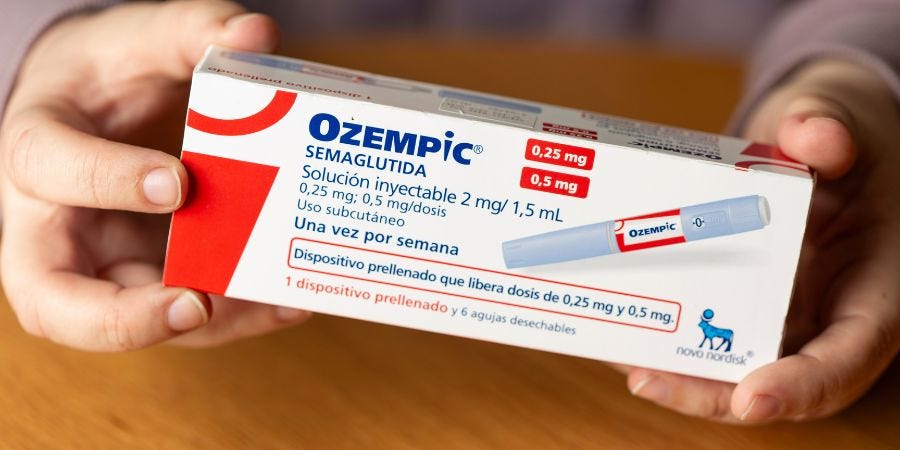Key Takeaways:
- Ozempic is a drug approved for lowering blood sugar levels in adults with type 2 diabetes and is also used for weight management.
- Lesser-known side effects of Ozempic include nausea, dry mouth, and urinary incontinence due to weakened pelvic floor muscles.
- You should speak with your healthcare provider if you’re experiencing incontinence symptoms like urinary leakage while taking Ozempic.
You’ve probably heard about Ozempic by now, and whether you’re taking the medication to lower blood sugar or to manage your weight, you should be aware of the less common potential side effects like urinary incontinence.
Read this article to learn about Ozempic, the potential side effects, and how it can impact your body and pelvic floor muscles.
Check Your Eligibility
2 Easy Steps
Discover the continence care essentials available through your Medicaid plan.
What Is Ozempic?
Ozempic (generic name semaglutide) is a brand name GLP-1 drug that helps to lower blood glucose levels and promotes weight loss. Ozempic was approved by the U.S. Food and Drug Administration (FDA) in 2017 to lower blood sugar levels in adults with type 2 diabetes and obesity by creating more insulin through the pancreas. The drug slows the digestive system and produces more insulin through the pancreas.
More recently, Ozempic has gained attention because it’s been prescribed by healthcare providers for weight loss and weight management. However, it hasn’t been approved by the FDA for that purpose.
What Are the Common Side Effects of Ozempic?
The most common side effects of Ozempic may include:
- Nausea or vomiting.
- Diarrhea
- Stomach pain and abdominal pain.
- Constipation
- Pancreas inflammation (pancreatitis).
- Vision changes.
- Low blood sugar (hypoglycemia).
- Kidney problems, including kidney disease and failure.
- Serious allergic reactions.
- Gallbladder problems.
Does Ozempic Make You Pee More?
While the typical Ozempic side effects are well known, there are certain side effects that have been reported by those prescribed the medication, including dry mouth, hair loss, gum inflammation, bad breath, and urinary incontinence.
Urinary incontinence (UI) is the loss of bladder control that often leads to urinary leakage. There are many different types and causes of UI, but Ozempic may lead to a type of UI called stress incontinence.
Stress incontinence develops when the pelvic floor muscles cannot accommodate the pressure demands from physical activity placed on them. The pelvic floor muscles support the urinary sphincter, so as the muscles grow weaker, the urethra loses its ability to hold in urine. The main symptom of stress incontinence is leaking urine when sneezing, coughing, exercising, bending over, or lifting heavy objects.
Common causes of stress incontinence in women include:
- Vaginal delivery childbirth.
- Urinary tract infections (UTIs).
- Neurological disorders, such as spina bifida, multiple sclerosis (MS), Parkinson’s disease, etc.
- Pregnancy
- Menopause
- Chronic coughing.
- Nerve injury.
- Pelvic surgery, such as a hysterectomy.
- Aging
In men, the most common causes of stress incontinence include:
- Prostate surgery.
- Enlarged prostate or treatments for enlarged prostate.
- Neurological conditions.
- Nerve injury.
- Aging
Because Ozempic may result in rapid weight loss, individuals experiencing this side effect may lose muscle mass in the body and in the pelvic floor muscles. Women taking Ozempic who lose pelvic floor muscle mass may experience weakness in the pelvic floor muscles that surround the vagina and urethra, which can lead to stress incontinence.
How to Treat Urinary Incontinence
There are treatment options for those taking Ozempic and experiencing stress incontinence. In many cases, stress incontinence is treatable and reversible.
- Speak with your healthcare provider. The first step in managing stress incontinence is to speak with your healthcare provider about your symptoms and let them know if you’re taking Ozempic or if they weren’t the provider who prescribed it. They should be able to diagnose your incontinence and help you make a plan to reverse it.
- Do pelvic floor exercises. Pelvic floor exercises are for men and women and have been proven to strengthen pelvic floor muscles, which is essential to treating stress incontinence. You should incorporate these exercises into your regular workout routine.
- See a pelvic floor physical therapist. If exercising your pelvic floor at home isn’t for you, a pelvic floor physical therapist will work with you to create an exercise plan to treat your incontinence symptoms.
- Talk with your healthcare provider about Ozempic. If other treatments have been unsuccessful in treating your incontinence symptoms, speak with your provider about your incontinence symptoms and ask if there are medications alternative to Ozempic that will help with your type 2 diabetes or weight loss management.
- Wear bladder control products. If you’ve been diagnosed with stress incontinence (or another type of incontinence), you may qualify to receive free bladder control supplies, such as adult protective underwear and bladder control pads with Aeroflow Urology. These discreet products will keep you dry and comfortable throughout your day, and you may receive them for free through your insurance plan. Check your eligibility for free supplies today.
References
https://www.facebook.com/Drugscom. (2023). Does Ozempic make you pee more? Drugs.com. https://www.drugs.com/medical-answers/ozempic-make-you-pee-more-3575131/
UC Davis Health. (2023, July 19). Ozempic for weight loss: Does it work, and what do experts recommend? Cultivating-Health. https://health.ucdavis.edu/blog/cultivating-health/ozempic-for-weight-loss-does-it-work-and-what-do-experts-recommend/2023/07
Ozempic. (2023, August). Ozempic® Side Effects | Ozempic® (semaglutide) injection 0.5 mg or 1 mg. Www.ozempic.com. https://www.ozempic.com/how-to-take/side-effects.html
Disclaimer
Information provided on the Aeroflow Urology blog is not intended as a substitute for medical advice or care from a healthcare professional. Aeroflow recommends consulting your healthcare provider if you are experiencing medical issues relating to incontinence.













